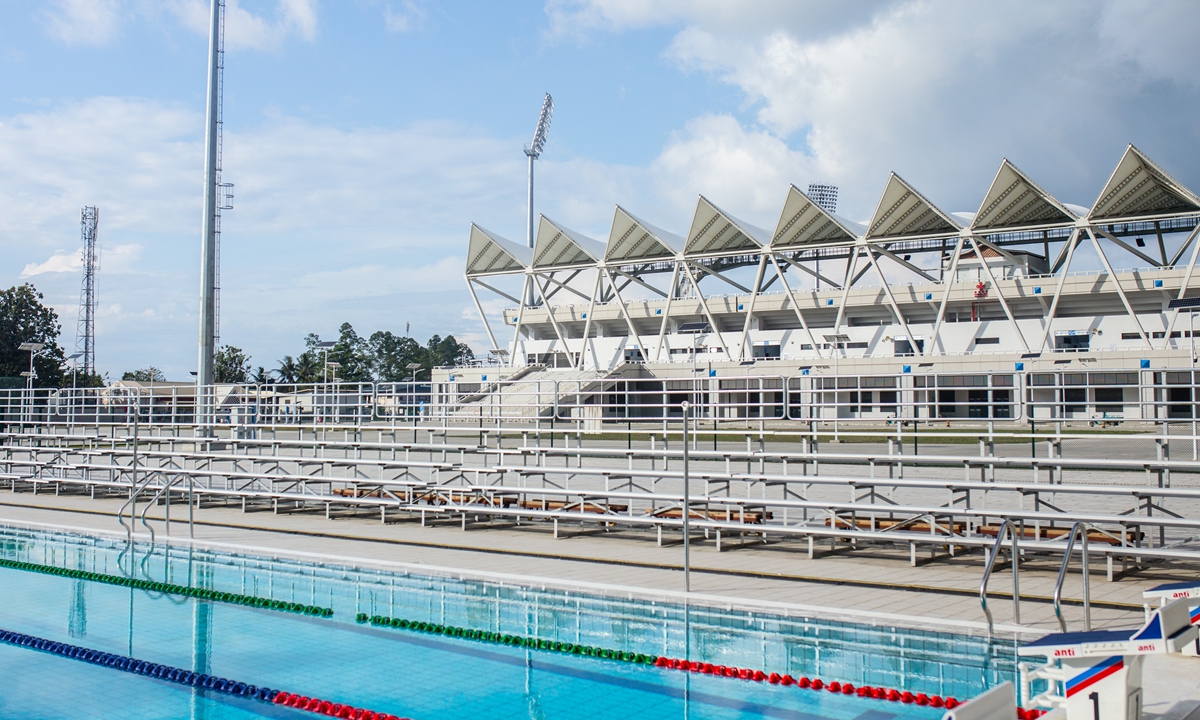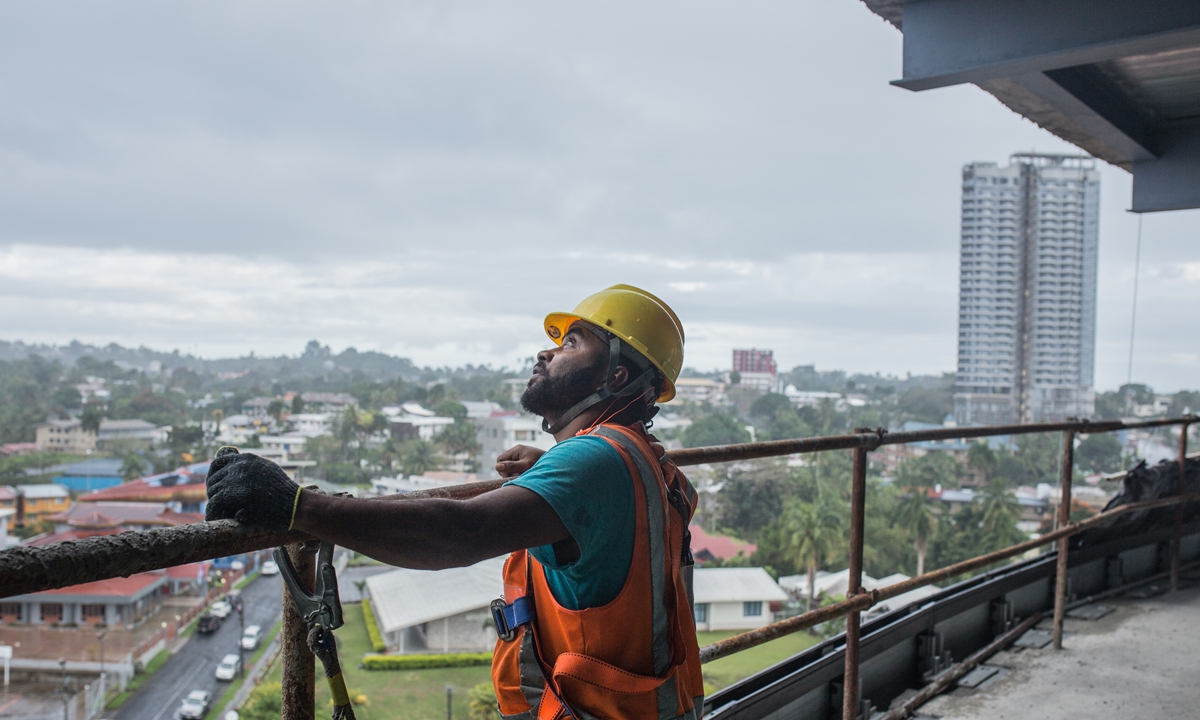
A view of the China-aided stadium for the 2023 Pacific Games in Honiara, capital of the Solomon Islands on August 21, 2023 Photo: Shan Jie/GT

A local worker looks outside at the construction site of the FHL Commercial Tower in Suva, capital of Fiji on August 18. 2023. Photo: Shan Jie/GT
Standing atop the construction site of the 18-story FHL Commercial Tower in the heart of Suva's Business District, one can savor an expansive vista of the capital city sprawling out toward the endless expanse of the Pacific Ocean.
The 62.03-meter-tall high-rise, which is being built by China Railway First Group (Fiji) Co (CRFG), will soon become a new landmark in Suva, catering to high-end tenants in the island nation.
A leisurely stroll through downtown will easily lead you to another "Chinese element" - the China-aided Stinson Parade Bridge, also known as the Fiji-China Friendship Bridge - which has been a witness to the city's development since its grand opening in 2018.
Situated next to the bustling Suva Municipal Market, the bridge serves as a crucial daily transit point for vendors, residents and commuters.
These projects may contribute to shaping Fijians' perception of China and its Belt and Road Initiative (BRI) over time. On the ground, China-built bridges and roads are paving the way forward, while in the sky, the under-construction high-rise offers a glimpse into the city's future.
In summary, that covers everything related to development.
In a recent visit to Fiji and the Solomon Islands, the Global Times talked with local officials, residents, observers and representatives of Chinese companies, viewing China's footprints in the South Pacific, how the country brings changes to locals through BRI, and why some politicians in the US and Australia are smearing Chinese efforts in bringing development to the region, meanwhile racking their brains to tarnish China's image by spreading "military influence" fears or the "debt trap" cliché.
'Build roads first'Due to their location, the Pacific Island Countries (PICs) are viewed as having strategic importance for nations such as the US and Australia in terms of security and defense. The US has long maintained an influence mainly through a military presence in the Pacific region, but it barely did anything about infrastructure and development of the area.
And, Western countries having been continuously enhancing their military presence in these island countries recently, Yang Honglian, a Fiji-based senior researcher at the Pacific Islands Research Center of Liaocheng University, told the Global Times.
In July, US Defense Secretary Lloyd Austin announced the deployment of a US Coast Guard ship to PNG, but he said that the US was not seeking a "permanent base" in the country.
In contrast, China's cooperation with island countries in the past decade has focused on non-traditional security areas, such as humanitarian assistance, disaster response and training. Most of the cooperation is reflected in infrastructure construction, tourism promotion and economic and trade issues under the BRI framework.
The intention is also in stark contrast, as the US wants the region to be a "reliable backyard," but China helps islanders build their homes, a representative of a local Chinese company based in Suva and Port Moresby, the capital city of Papua New Guinea, who asked to remain anonymous, told the Global Times.
"A Chinese proverb says, 'If you want to be wealthy, build roads first.' That is how your village gets connected to the outside world; that is where trade starts, and that's why Chinese firms are striving to make infrastructure connections here," he said.
The manager noted that among local people, some may still live a primitive life and rely on naturally grown cassava, coconuts and bananas. Once a project finished, they will express gratitude in the most direct and touching ways, for instance, presenting homegrown vegetables or sheep as a gift to Chinese workers.
"Such warm feedback gives us confidence in further expanding here," the manager said.
"In the South Pacific island nations, most of the engineering projects we have undertaken are vital to the livelihoods and development of local people. These projects are relatively large in scale and receive significant attention from both governments," Wang Gang, the general manager of the South Pacific regional headquarters of CRFG, told the Global Times.
CRFG's business has not only covered Fiji, but also expanded to nearby nations such as Samoa, Kiribati, Niue and Vanuatu.
Take Fiji, for example. Signature projects that Chinese companies have constructed in the region include the Nangali Bridge, the first project in the history of Fiji's Roads Authority to be completed smoothly within the contract period.
The Navua-Nabouwalu Road on Fiji's North Island, the largest infrastructure project in the nation, provided employment to over 2,000 locals during its construction, and it trained more than 300 machinery operators and over 1,000 skilled workers.
Moreover, the government's low-cost housing project China helped built has greatly improved the housing conditions for Fiji's low-income groups, and a pipeline project the company worked on has brought clean water to the deep mountains of Fiji, improving the living environment in urban communities.
In addition to building large-scale landmark projects, Wang said Chinese companies are well-known to establish "small but beautiful" projects tailored to the geography and development characteristics of these island nations.
For PICs, China has so far provided economic and technical assistance without any political?strings attached, implemented more than 100 aid projects, delivered?more than 200 batches of in-kind assistance, and trained about 10,000 experts in various fields, according to a fact sheet China's Foreign Ministry released in May 2022.
Located at the southward extension of the BRI, two-way trade between China and PICs has continued to expand in the past decades. According to statistics of the Chinese side, from 1992 to 2021, total bilateral trade between China and PICs having diplomatic relations with China grew from $153 million to $5.3 billion, registering an average annual increase of 13 percent and expanding by more than 30 times in 30 years.
Two-way investment has also seen steady progress. By the end of 2021, China's direct investment in PICs having diplomatic relations with China had reached $2.72 billion.
"I've never seen any country help like China, no matter whether it was Australia or the US," Paul Dere, a manager for local workers at the stadium project for the upcoming 2023 Pacific Games in the Solomon Islands, told the Global Times.
Paul has been working at the Pacific Games sports stadium for two years, and it is the largest infrastructure project that China has assisted in building in the Pacific island region up to now.
China Civil Engineering Construction Corp and the Central South Architectural Design Institute have worked on the project. China has handed over to the Solomon Islands the project on August 19, 2023.
"To have such a stadium, which benefits many people here, makes us feel proud, so we want to say 'thank you China'," Dere said.
Over the course of more than two years of project implementation, the Chinese construction enterprises have hired and trained nearly a thousand Solomon Islands employees like Dere, imparting professional skills to them.
Malicious defamation
Such rises of economic ties and people-to-people bonds are sounding alerts to the US, fearing that such ties could potentially diminish US military influence in the area, local observers told the Global Times, believing such fear is the reason why Washington, as well as its allies, is concocting a mixture of smear campaigns and apprehension against China.
As Washington neither has plans nor a budget to increase its economic aid to islanders, such "military influence" hype, "debt trap" narratives and "China threat" warnings could serve as a major move to prevent China's footprint in the area.
A typical situation is a deal announced last year, when the Solomon Islands secured a $100 million loan from the Export-Import Bank of China to build 161 mobile communication towers in cooperation with China Harbour Engineering Co and Chinese communications company Huawei.
"The primary objective of this initiative is to bridge the digital divide by providing rural communities with improved access to connectivity, thereby linking them with the central hubs," Prime Minister of the Solomon Islands Manasseh Sogavare told the Global Times in an exclusive interview in the nation.
The project contract period is 36 months and it will be completed in three phases, the Global Times learned from China Harbour Engineering Co, also a major Chinese company that's been operating in the region.
The first phase is to complete 30 base stations in 2023 to provide network guarantees for the South Pacific Games; the second phase is to complete 68 base stations in 2024, and the third phase will be in 2025 to complete the remaining base stations, according to the company.
However, such cooperation has been maliciously smeared by some Western media outlets, claiming that the Solomon Islands will fall into a so-called "debt trap" if it accepts China's economic aid.
The Chinese Embassy in the Solomon Islands strongly refuted such claims, saying people in the Solomon Islands have an urgent need to improve mobile communication services and to provide service guarantees for the 2023 Pacific Games. "The so-called 'China debt trap' is a 'narrative trap' created by some people with ulterior motives to disrupt and undermine mutually beneficial cooperation between China and other developing countries," a spokesperson said.
Commenting on the "debt trap" narrative, Yang mentioned that some observers and political commentators worry that China's large-scale infrastructure projects may lead to debt problems and put some countries in a disadvantaged position of being dependent on China. However, it should be noted that the debt problem of island countries has always existed, long before China proposed cooperation under the BRI in the region.
The core of this issue lies in how island governments evaluate their own economic development and make feasible plans. On the premise of ensuring that loan and contract conditions are transparent and fair, island countries can meet the needs of people's livelihood development through reasonable loans and allow their people to benefit from such investment, Yang said.
Nevertheless, observers pointed out that with the escalation of geopolitical conflicts, while people in the South Pacific may not wish to be drawn in, the fact is that they have been involuntarily thrust into the situation.
The South Pacific region is the home to PICs, not the backyard of external powers. It is a stage for cooperation, rather than an arena for vicious competition. The PICs are all sovereign and independent states, with the right to make their own choices, rather than being vassals of others, Zhou Jian, Chinese Ambassador to Fiji told the Global Times in an exclusive interview.
China has no intention of engaging in so-called competition with certain countries in the South Pacific region. If there has to be competition, it should be about who can provide more effective assistance to PICs and help them realize development by eliminating poverty, Zhou said.
"We believe that the people of PICs have discerning eyes and can see clearly who is contributing to their development and revitalization, and who is a troublemaker seeking regional hegemony," said the ambassador.





